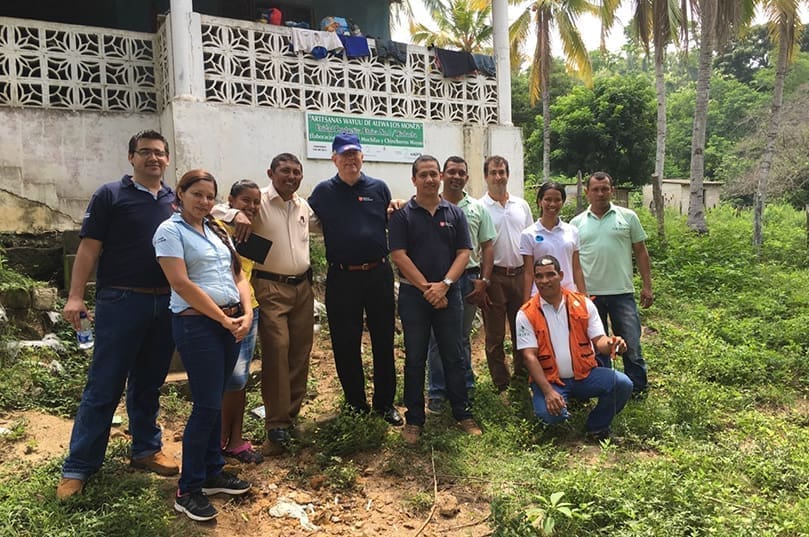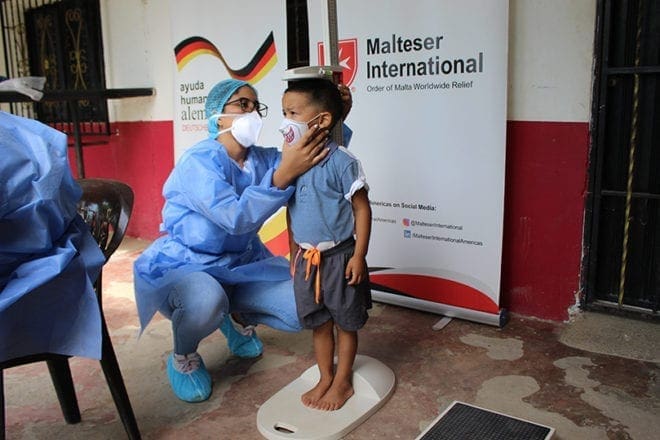 Photo Courtesy of Tom Wessels
Photo Courtesy of Tom WesselsAtlanta
Atlanta Catholic offers Lenten invitation to serve the hemisphere’s poorest
By PRISCILLA GREEAR, Special to the Bulletin | Published March 18, 2021
ATLANTA—Retired U.S. Army Reserve Maj. Gen Thomas Wessels invites Catholics to deepen their Lenten spiritual experience by joining the Malteser International Americas mission to uplift the hemisphere’s poorest. A parishioner of Holy Spirit Church in Atlanta, Wessels is the relief agency’s president.
And with exacerbated suffering due to COVID-19, it’s pro-life work to aid famished Haitians, impoverished indigenous Colombians and forgotten Venezuelan refugees.
“Since we’re approaching Easter and people start to think about important things in life I cordially invite them to enrich their participation in and preparation for Easter by basically bringing the warmth of solidarity and charity that we bring to our beneficiaries, bringing that to their lives and the lives of people in need around the world,” said Wessels. “I was reminded of Matthew 25, verses 35-36. ‘For I was hungry and you gave me something to eat.’”
“What the Order of Malta and Malteser International have been doing since early 12th century, our motto is to defend the faith and take care of the sick and poor, and that we continue to do,” he said.
The order’s relief agency Malteser International was established in Germany after World War II and began serving the Americas in 2010 following Haiti’s earthquake. Retired from a 43-year banking and 37-year military career, Wessels was elected board president in 2017 and will end his term in June, to be succeeded by board member John McInerney. He has worked to spread the good news of the agency’s 12 humanitarian projects in seven countries of the Americas and raise its national profile.
With the pandemic devastation, the nonprofit doubled its program and funding in 2020 because of urgent needs in northern Colombia departments of La Guajira and Magdalena in the areas of healthcare and water, sanitation and hygiene (WASH), COVID prevention, food security and emergency relief. MIA struck its first partnership with the US Agency for International Development to protect rural indigenous Wayuu communities from COVID-19, expanded a maternity program for uninsured migrant mothers and launched a partnership with a local university to produce hand sanitizer.
In addition, they’ve aided thousands of the 1.7 million refugees from across the border in Venezuela who settle in the region, many with Wayuu roots. And it denounced the Colombian government’s denial of vaccines to the undocumented that comprise about 55 percent of migrants, after which the government reversed course to allow vaccination.
“It’s our mandate as well—as an international organization—to make these disparities known to the public without taking sides,” said executive director Ravi Tripptrap.
Over the past six years, MIA has become a significant health provider to the Wayuu indigenous population displaced from southern Colombia to the northeast, where villages now are “fighting for survival,” said Wessels.
Furthermore, “What’s happening in Venezuela is almost a grievous crime against humanity because what they’re doing in their country is affecting other countries,” he said. “The world is still focusing on Syria and Iraq with billions of dollars where maybe $500 million total has been spent in response to the refugees of the situation in Venezuela.”
Wessels recalled one village where locals got their water from a nearby muddy lake where many cows, sheep and pigs bathed, defecated and urinated.
“That’s why our mission is to go in there and we take water and introduce sanitation and hygiene and in addition with COVID-19 we take the advocates and go out into the community with medical professionals,” he said. “One woman who was a doctor in Venezuela now she’s on the leading edge of going into the communities and helping them to be able to get shots.”
Walking the walk
In a region suffering from shortages of medicines, staff and equipment, MIA operates health clinics and medical brigades, largely hiring local staff. One of their most vital ministries is maternity care, from deliveries and midwife training to mother and child nutrition. Likewise, the Order of Malta in Atlanta raises funds for two pregnancy centers and in Bethlehem cares for women and children at Holy Family Hospital.

A Malteser International Americas staff member measures a child’s growth as part of an infant care program in Colombia. Photo Courtesy of Malteser International Americas
COVID has taught them to bring more health care out to the people in remote desert areas facing drought.
“There’s food insecurity, it’s all interlinked. It’s the poorest of the poor and they don’t have any means of transportation—it’s a donkey. So this mobile outreach is really making a big difference there,” added Tripptrap.
The pandemic has also made it harder for Venezuelan refugees and other poor to earn money through day labor.
“Not only is there no access to food, water, sanitation but there’s also no income,” said Tripptrap. “It’s the humanitarian crisis of our time.”
The overriding goal is to make communities more resilient.
“In the agriculture sector, it’s certain techniques for diversification of crops. We’re trying to reach the fishermen to fish not only giving fish out,” he said. “It’s really a very holistic approach but of course in a pandemic year the health sector is the main focus.”
In Haiti, MIA also perseveres in WASH initiatives in Port-au-Prince and rural food and nutrition security under dire conditions, where the country faces starvation from drought and rising crime and gang violence.
“The Global Hunger Index has classified Haiti as alarming, the worst category they have, and it’s on top of this there’s the pandemic and it can’t get worse than that,” said the executive director.
Tripptrap commended Wessels’ steadfast work to take Malteser Americas “to another level.”
“His leadership skills are outstanding and on top of that he is someone who not only talks the talk but walks the walk,” he said. “He’s very authentic and people see and believe. He’s truthful in what he says and they follow that example, a great nonprofit leader.”
Wessels is grateful for his dedicated team and the new American funding beyond the German government.
“When you’re able to come together and raise the funds and put it together to a good use you see it there and it’s very gratifying. Within the last couple years we became the U.N. primary medical provider in Colombia,” he said. As other nonprofits pulled out, “the people in USAID started seeing the good work we were doing. We were spending our money efficiently to bring the things needed to the rural communities.”
Wessels displays in his living room a flower made from a banana tree presented to him by a Colombian girl.
“They are so grateful for what we can do for them and the world has no idea what they go through. Then you go to Haiti and see kids with no clothes on, and the sewage system and the crimes and no government. It’s to be able to bring some good from that and get people engaged,” he said. “And Matthew 25 is as important today as it was many, many years ago. And we’re trying to make sure we stress the inherent dignity of each person and recognize them each as a person of God regardless of their religion, background and political convictions. We’re a year into this pandemic and the situation of the vulnerable has been increasingly more precarious.”